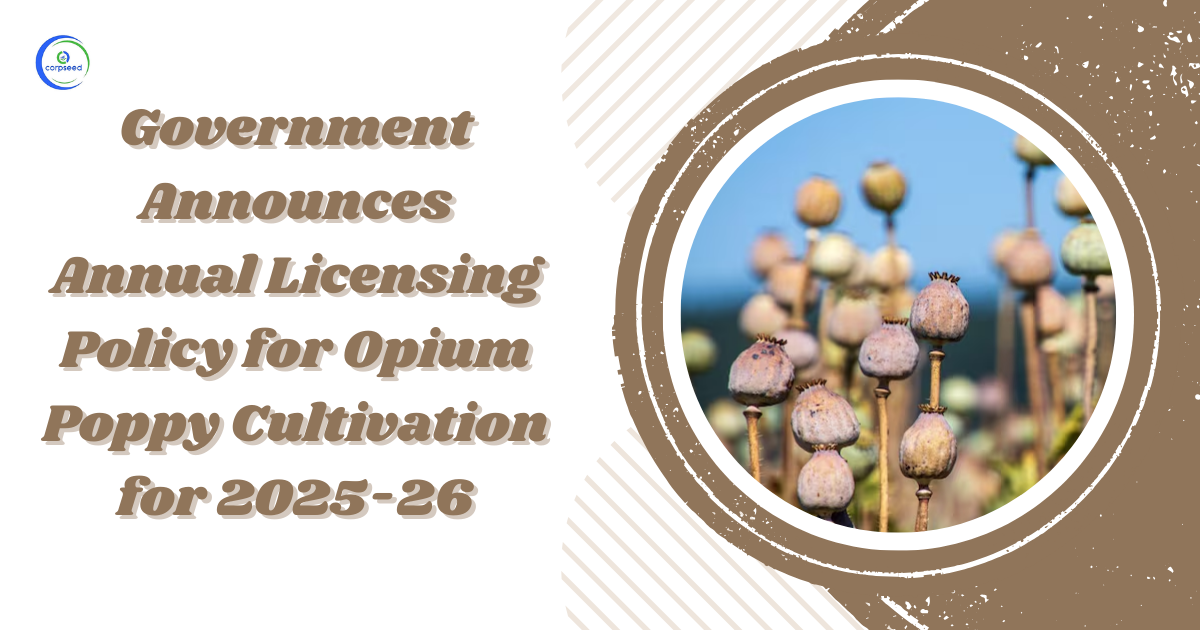The Union Government has announced the annual licensing policy for opium poppy cultivation for the crop year 2025-26. This is applicable from 1 October 2025 to 30 September 2026. This policy will greatly benefit the farmers of Madhya Pradesh, Rajasthan and Uttar Pradesh. Nearly 1.21 lakh farmers are estimated to get the license this year, which is an increase of 23.5% when compared with last year. This expansion includes 15,000 extra farmers, which will lead to much better and greater participation in opium cultivation.
Table of Contents
Increase in Farmer Participation
The new licensing policy allows more farmers to take part in opium cultivation under strict government rules. Last year, fewer licenses were issued, but this year’s decision covers an additional 15,000 farmers. The government has digitized farmer data since 1995-96, which has made it easier for marginal farmers to rejoin the system if they meet the required conditions. This move strengthens inclusivity and supports rural livelihoods in these states.
Key Features of the Licensing Policy
The 2025-26 opium cultivation policy introduces important guidelines for farmers:
- Farmers who achieved an average morphine yield (MQY-M) of 4.2 kg per hectare or more will continue with opium gum cultivation.
- Farmers with yields between 3.0 kg and 4.2 kg per hectare can cultivate unlanced poppy straw under the CPS (Concentrate of Poppy Straw) method, with a five-year license validity.
- High-performing farmers with 900 kg per hectare and above of unlanced poppy straw will get the chance to switch back to opium gum cultivation, promoting higher productivity.
- Farmers who failed to meet the minimum qualifying yield of 800 kg per hectare under CPS cultivation in 2024-25 will have their licenses suspended for the new crop year.
Boost to Medical and Pharma Needs
The main purpose of this government policy is to stabilise the welfare of farmers along with national healthcare needs. India requires a balanced supply of alkaloids so that it can manufacture essential medicines, especially for pain relief and palliative care. The government is working very well to increase the capacity of opium and alkaloid factories, thereby increasing autonomy. The Government alkaloid factory located in Neemuch has recently received WHO GMP certification, which is increasing India's credibility in the pharmaceutical market all over the world. This policy promotes the mission of Atmanirbhar Bharat and supports the Make for World vision, it helps Indian pharmaceutical companies to expand their role in global alkaloid APIs and their formulation.
Focus on Transparency and Growth
While upgrading the systems and doing strict monitoring, the government is taking the risk of change and is giving promotion to the farmers with the help of incentives. Farmers will get a lot of benefits from this policy, all the needs of the healthcare sector will be fulfilled, and India's pharmaceutical industry will become much stronger in the global markets, due to which India's credibility will automatically increase.
The annual licensing policy for opium poppy cultivation 2025-26 is an important step, due to which participation of farmers will increase, clarity will increase, and medical needs will be fulfilled. Giving priority to 1.21 lakh farmers who are eligible and self-reliant, this policy will not only support rural livelihood but will also take India to a better page in which India's pharmaceutical sector will appear very strong and self-reliant to the entire world.
This portion of the site is for informational purposes only. The content is not legal advice. The statements and opinions are the expression of author, not corpseed, and have not been evaluated by corpseed for accuracy, completeness, or changes in the law.

